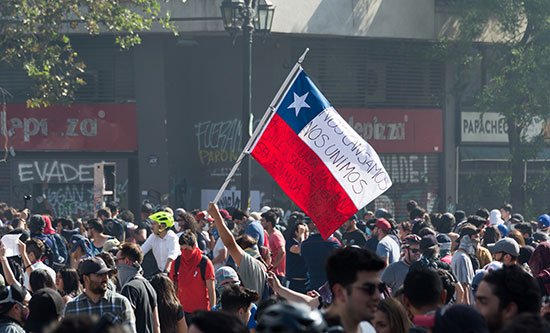
Massive protests across Latin America, in Chile, Ecuador, Bolivia, Colombia and Haiti and the electoral victory in Argentina are clear working class responses to the continued vindictive assaults on them by imperialism.
The US has interfered with governments in Latin America since the 19th century and is as active today as ever. The most recent examples – in addition to the continuous and open economic warfare and political subversion directed at Venezuela for nearly 20 years, and against Cuba for 60 years – are its support for November’s expulsion of Morales in Bolivia, its satisfaction at the imprisonment and consequent removal of Lula from the October 2018 Brazilian elections, its failed attempt to violently remove Ortega in Nicaragua in April 2018, and the subordination of Moreno in Ecuador to its will following his appointment in April 2017.
The intensifying struggle between the two great classes comes as the rate of accumulation of capital globally is slowing. Agriculture and mining form the basis for Latin America’s economy, and from 2010 to 2018 the overall accumulation rate fell from 6.3% to 1.4%. The average rates of growth of 6% from the 1960s to the 1980s were based on dictatorships imposed by US imperialism, so the result of cruel political oppression. Profits were maximised by imported capital and increased state debts, to fatten imperialist property owners. Today, imperialist exploitation must intensify across Latin America, Africa and Asia, or the global system of capital will continue to stagnate. Alongside wage cuts, reducing state spending that benefits workers is essential for the ruling elite. This explains the budget cuts now being enforced in every state in Latin America, whether on transport, pensions (with increases to the retirement age), wage levels, employment and educational rights, and so the necessary fightback by the working class.
Against this are ranged the mass protests in Chile against the constant degradation of the standard of life and privatisations by its ruling class, the mass demonstrations in Ecuador against the same attacks on living standards, the striking success of the ‘Fernandez’ partnership in the Argentinean elections, and the mass strikes and protests against the reactionary Duque government in Colombia and its deliberate, systematic policy of violence towards any voice raised for the poor.
The workers and poor peasants in Latin America feel the daily threat of US imperialism’s demands for a constant accumulation of private wealth, of capital. This produces a massive and impoverished official labour reserve of over 30 million workers – more than 13 million of these in Brazil, with the informal economy disguising an additional 30 million unregistered hungry workers in Mexico alone, and five million in Argentina. Add to this the destruction of the natural environment and its consequences and the workers have no choice but to rebel. The current fightback by a class-conscious working class across the region is automatically counter-attacked across the board by the criminal in chief, US imperialism. The class struggle over the ownership of the conditions of life is the motor of all political developments. This is a challenge that no socialist can ignore.
Despite open appeals for US military intervention in Venezuela, direct military seizure of power in Latin America has been made almost impossible in recent years by the constantly developing resistance of the masses and without doubt the material support of the Russian and Chinese governments. The aggressive US stance towards these two governments results from this support that threatens a huge source of wealth for US imperialism. The resurgence of military interference in the choice of governments cannot however be dismissed. The rich and middle classes quickly call upon the police and military when any steps are taken to remove their privileges. This is now seen in Bolivia. The armoury of reaction provides for criminal acts of all sorts, the use of bribery, racism and religious bigotry, parliamentary manipulation and electoral obstruction, paid-for campaigns of violence and murder against progressive organisations. Such means are energetically pursued in support of monopoly capital and financial plunder, all disguised by a wall of lies and deceit in the billionaire and collaborative media.
The defeat of Mauricio Macri in October general elections by Alberto Fernandez is the first time in Argentina’s history that a sitting president has lost a re-election bid. Under Macri’s neo-liberal policies public debt rose from just over 50% of GDP in 2015 to 90% last August. Much of this debt is in foreign currency. Without renegotiation Argentina will have to pay private and international organisations 6% of GDP in 2020. Adding payments for 2021 to 2023 this becomes 17% of GDP. The International Monetary Fund will demand ‘fiscal adjustments’ in any debt negotiations. The new government takes office on 19 December. Will it reject the IMF or capitulate to it and pay the debt with the continued hunger of Argentina’s children, more than 53% of whom are poor?
In Bolivia, a coup against President Morales came as his election victory in November became certain; ballot boxes were destroyed to prevent a recount, the army and police capitulated to pressures of organised violence supporting the millionaire opposition. This was followed by a quick legislative polish to try and legitimise the new rulers and prevent Morales from running for the presidency again.
The targets of reaction are in every case those forces that make democratic demands, demands that inevitably frustrate the desperate attempts of capitalism – especially US imperialism – to renew its accumulation of wealth on a global scale. Our articles report on those struggles and their significance for workers across Latin America.
Alvaro Michaels
Fight Racism! Fight Imperialism! 273 December 2019/January 2020




